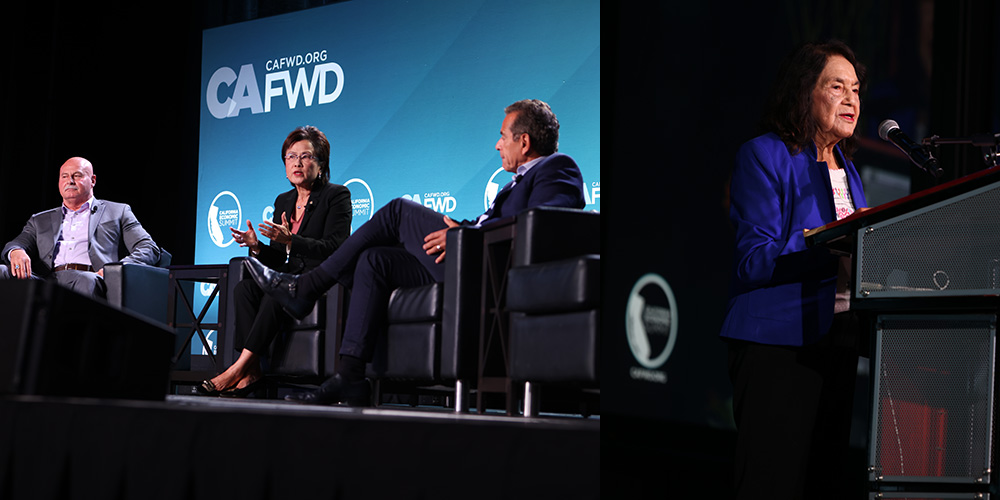
(Photo: April McGill/CA FWD)
As California and the rest of the country emerges from the fallout from the COVID-19 pandemic, the California Economic Summit opened today in Bakersfield to address challenges and opportunities. The opening plenary session, “California at a Crossroads – Leading in Challenging Times,” focused on economic, climate and energy issues facing the state.
“We’re the fourth largest economy in the world with the highest effective poverty rate,” said Villaraigosa, Infrastructure Advisor to Governor Newsom. “We have too many people that are working every single day and they’re not making it.”
Iconic California labor leader Dolores Huerta echoed those sentiments. “We have heard today that California is on the verge of becoming the fourth largest economy in the world, but yet as we look at our [San Joaquin] Valley here, we that we have so much poverty here. How can that be?”
Huerta also tied California’s economic outlook to its investment in education. “Here in the San Joaquin Valley, from Bakersfield to Sacramento, there have been over 20 prisons that have been built since 1965 and only one university [University of California at Merced]. We see that this is where our tax dollars are going.” She added that the state budget for prisons is higher than the budget for high schools.
Tara Lynn Gray, director of the CA Office of the Small Business Advocate, announced the formation of the CA Entrepreneurism & Economic Mobility Task Force to encourage inclusive entrepreneurship through policy and programs they need to grow. She led a panel discussion that included Carolina Martinez, CEO of California Association for Micro Enterprise Opportunity (CAMEO), Jason Paguio, president and CEO, Asian Business Association Foundation and Lorraine Salazar, second vice chair, California Restaurant Association.
As the State’s “infrastructure czar,” Villaraigosa is tasked with overseeing the funds allocated by the federal government through the Infrastructure and Jobs Act and by the state government to infrastructure projects throughout California. “The State of California has decided that this issue of infrastructure is critical to moving our economy forward, to putting more people to work in good, middle-class jobs.”
This was good news to Bakersfield Mayor Karen Goh who hosted a panel about infrastructure with Villaraigosa and Fresno Mayor Jerry Dyer.
“If we have an economy that doesn’t work for too many people, why aren’t we using all the tools in the toolbox to re-charge, to catalyze that economy? To put people in good, middle-class homes so they could buy in Bakersfield or Fresno?” said Villaraigosa. He pointed to the fast-track construction of SoFi Stadium in Inglewood and the Golden 1 Center in Sacramento compared to the construction of the high-speed rail line through the Central Valley or other infrastructure projects across the state.
“Don’t you love that — acceleration and the cutting of the red tape? That’s going to make a difference,” said Mayor Goh.
Assemblymember Vince Fong (R-Bakersfield) and Kern County Supervisor Zack Scrivner stressed that Kern County produces a large majority of the energy consumed by the rest of the state and that cannot be overlooked when making statewide policy. And the Nature Conservancy’s Jay Ziegler spoke about how climate change is affecting California through the current historic drought and frequent wildfires throughout the state.
The Kern Community College District introduced Summit attendees to Kern County through a musical presentation that included county, educational and municipal leaders.
The California Economic Summit continues tomorrow with panel discussions that center around regions up solutions to create a just and sustainable state and the presentation of the Regional Steward Leader Award to Los Angeles County Economic Development Corporation’s President and CEO Bill Allen, the Statewide Steward Leader Award to Kate Gordon, senior advisor to energy secretary Jennifer Granholm at U.S. Department of Energy (DOE), and the Young Leader Award to Michael Wiafe, Government and Community Relations Fellow at the Inland Empire Community Foundation.

